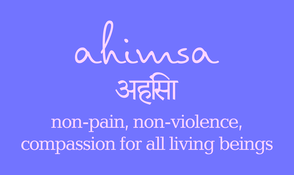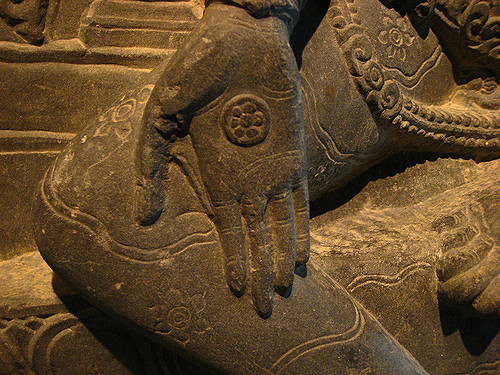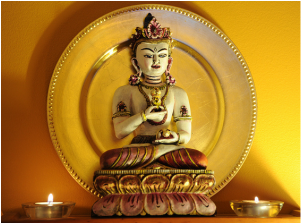Lotus Heart Zen Chanting Meditation Books
Regular Sunday Morning Meditation
|
The last Sunday of each month
| ||||
Chanting Practice

Chanting meditation is an important aspect of daily Zen practice. At first you may not understand. But after you chant regularly, you will understand. Chanting meditation means keeping a not-moving mind and perceiving the sound of your own voice. Perceiving your voice means perceiving your true self or true nature. Then you and the sound are never separate, which means that you and the whole universe are never separate. Thus, to perceive your true nature is to perceive universal substance. With regular chanting, your center gets stronger and stronger. When your center is strong, you can control your feelings, condition and situation.
[At Lotus Heart Zen] we practice together. At first, people come with strong opinions, many strong likes and dislikes. For many people, chanting is not easy: much confused thinking! However, when we do chanting meditation correctly, perceiving the sound of our own voice and those around us, our minds become clear. In clear mind, there is no like or dislike, only the sound of the voice. Ultimately, we learn that chanting is not for our personal pleasure, but to make our direction clear, in order to save all beings from suffering.
When you are chanting, you must perceive the sound of your voice, and when you do, you and the universe have already become on. Suffering disappears; true happiness appears. This is called nirvana. If you keep nirvana, your mind is clear like space. Clear like space means clear like a mirror. Red comes, red. White comes, white. Someone is happy; I am happy. Someone is sad; I am sad. Someone is hungry; give them food. The name for this is Great Love, Great Compassion, the Great Bodhisattva way. That also means Great Wisdom. This is chanting meditation, chanting Zen. -- Zen Master Seung Sahn
Photo credit: Korean Buddhist Monk At Haedong Yonggungsa
[At Lotus Heart Zen] we practice together. At first, people come with strong opinions, many strong likes and dislikes. For many people, chanting is not easy: much confused thinking! However, when we do chanting meditation correctly, perceiving the sound of our own voice and those around us, our minds become clear. In clear mind, there is no like or dislike, only the sound of the voice. Ultimately, we learn that chanting is not for our personal pleasure, but to make our direction clear, in order to save all beings from suffering.
When you are chanting, you must perceive the sound of your voice, and when you do, you and the universe have already become on. Suffering disappears; true happiness appears. This is called nirvana. If you keep nirvana, your mind is clear like space. Clear like space means clear like a mirror. Red comes, red. White comes, white. Someone is happy; I am happy. Someone is sad; I am sad. Someone is hungry; give them food. The name for this is Great Love, Great Compassion, the Great Bodhisattva way. That also means Great Wisdom. This is chanting meditation, chanting Zen. -- Zen Master Seung Sahn
Photo credit: Korean Buddhist Monk At Haedong Yonggungsa
Chants (streaming audio)
Below are some of the chants that Lotus Heart Zen practices. Not all of these chants are part of the daily liturgy.
As other chants are recorded, they will be added below.
Mantra of Light oṃ amogha vairocana mahāmudrā maṇipadma jvāla pravarttaya hūṃ
|
Going for Refuge in the Three Jewels
Photo credit: Zen
|
Heart Sutra (English)
| ||||
| The Heart Sutra Text |
Photo credit: Heart Sutra (Xuanzang)
The Five Cultivations
|
| ||||||||
Photo credit: Lotus Flower
Bodhisattva Vows
Photo credit: Bodhisattva
|
Well-Wishing Prayer
Photo credit: Prayer
|
Offering of Merit
Photo credit: Rin_Gong_and_Striker_1FL by James Russo
| ||||||
Buddha's Name Recitation
Photo credit: Buddha
Jijang Bosal Chant
Photo credit: An Old Stone Statue
|
Mañjuśrī Bodhisattva MantraOṃ A Ra Pa Ca Na Dhīḥ
Maha Karuna Dharani
| |||||||||
| Great Compassion Dharani Text |
Photo credit: Avolokitesvara
Vajrasattva Mantra
| Vajrasattva Mantra Text |
Photo credit: Shri Vajrasattva















